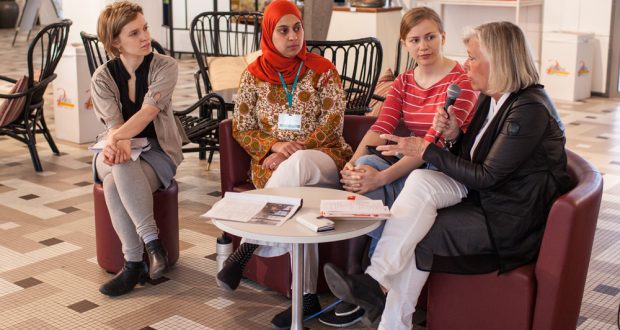What should we do to speed up access to university education for migrants and newly-arrived people? That question was subject for discussion in the debate-breakfast hosted by Lundagård on Wednesday 18 May.
As the number of refugees coming to Sweden increases, so does the pressure on society to integrate these people as well as possible, and for universities, this pressure consists of giving the newly-arrived the opportunity to either study or complement their previous education, in order to validate it.
Many people coming as refugees already have a tertiary education; in the previous issue of Lundagård (3/16), the piece entitled In the Waiting Rooms of Academia describes the fate of some of these people. May, Firas, and Alaa testify to issues with sloppiness and long waiting times, among other things, and such problems could continue being a reality if nothing changes. The debate on Wednesday started with a question about what obstacles actually slow the process down getting into university.
Lacks flexibility
“We have to address this problem on a national level to be able to validate these people’s education,” said Cecilia Christersson, deputy Vice-Chancellor at Malmö University.
Karolin Johansson, municipal politician representing the Swedish Green Party in the board of labour market, upper secondary school, and adult education issues in Malmö Municipality, who wrote her Master’s thesis on education validation, pointed out that The National Board of Health and Welfare want the seats of learning to take greater responsibility when it comes to integrating migrant students.
“Generally, we would like to avoid a system where highly educated people who come here are forced to wait for six years due to an application-process, to be able to get an education,” she said.
May came to Sweden as a Syrian refugee, escaping the civil war. After many unsuccessful attempts of continuing her education, she finally managed to do so, at Malmö University, where she is studying as well as being a student representative.
“What I feel is missing from University is professional flexibility. Many people on the run from wars do not have the possibility to get hold of all the paperwork necessary. It has to be possible to make it easier for those who do not bring sufficient documentation with them to university,” she said.
May brought up her experience from Linköping University as an example; there, she experienced a system out of joint. When she and her husband applied to the university, their applications had been refused due to sloppy translation of their degrees, but when they went to Linköping University to explain their situation, there was nobody who wanted to listen.
So what is the solution?
The debate progressed with a question about how the panel thought these obstacles could be reduced.
“We have to start out from the individual,” said Cecilia Christersson, “We must be flexible in our treatment of those with these circumstances, but we also need a common way to assess education, amongst the seats of learning.”
Karolin Johansson pointed out that distance education could be the answer to the problem. Refugees could then begin studying as soon as they feel well enough established in our society, and this solution is cheap as well. She also believes that it should be clearer that universities have a responsibility to validate previous education, even though they have to share this responsibility.
Who needs to act?
Next, the question of who it is, according to the panel, that we are waiting for – who needs to act to take us forward?
“The most important thing is that communication between the different parts involved in the process is in order,” Karolin Johansson said.
She mentioned a project active until recently in Malmö in which The Swedish Migration Agency and Arbetsförmedlingen collaborated, among others, and could provide each other with information about what each authority needed.
“Unfortunately, the project disappeared when money ran out,” Karolin Johansson said.
The rest of the panel agreed that coordination between different influential and responsible-carrying authorities is important.
“This is everyone’s issue,” May agreed.
In May’s view, spreading information is the best help – draw the attention of those in charge to the problems at hand. In Sweden, though, she finds that people have a hard time taking the first step towards change.
At Malmö University, they have one hour each day during which students can pose questions about the future of their studies or issues that have presented themselves. Cecilia Christersson emphasised the importance of having a transparent leadership – that there is good communication between management and students.
Is there anything students can do?
In the piece published in this newspaper’s previous issue, a representative from Lund University, among others, believed that lacking resources is a big part of why the validation and complementation work is so slow. When the debate drew to a close, the panel were questioned about for example to what degree speeding up the process depended on money, and if that was the case, whether students could do something about it?
“Everyone can contribute. You could be a mentor, attend a language café event, or just tell potential students about your education,” Cecilia Christersson said.
“Moreover, we do not need money to address the fact that many people come here, we need money to get educated people into work,” May said to clarify.
“The best thing you can do as an individual is to meet newly-arrived and try to explain your culture, as well as show an interest in theirs. There are several barriers for those new to Sweden, and we who have been here for a while already have to take the first step and make an active effort to find these people,” May said.
The debate-breakfasts hosted by Lundagård are arranged with support from the organisation Ung Media. Would you like to receive information about future debate-breakfasts? Like Lundagård’s Facebook-page.
Article: Axel Rydén
Translation: Richard Helander






